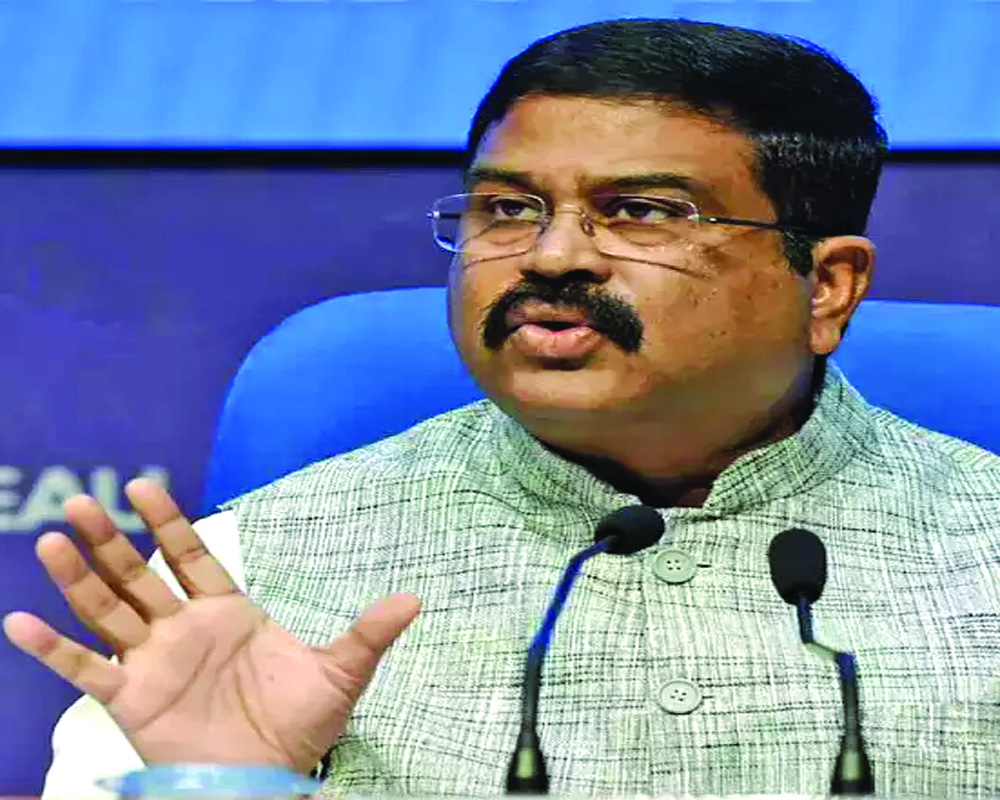Union Education Minister Dharmendra Pradhan on Tuesday announced that the Centre is introducing various reforms in the entrance examinations in the country beginning January and appealed to the state governments to extend their support for zero-error entrance tests.
Pradhan said the Radhakrishnan panel has submitted its report outlining reforms in the National Testing Agency (NTA) and to implement the recommendations, cooperation of states is essential.
“I have appealed to all state government education secretaries. A new entrance exam series for the upcoming year will begin in January. Based on last year’s experiences, the government has introduced numerous reforms,” he told reporters on the sidelines of a national workshop on higher and technical education attended by secretaries of states and Union territories (UTs).
“The Radhakrishnan committee has submitted its recommendations and to implement it, the states’ cooperation is essential. I have appealed to everyone on this matter, especially regarding entrance examinations.
“Bringing examinations, especially entrance exams, to zero error is the responsibility of both the Government of India and the state governments. We will work as a team to build confidence in the children of our country,” the education minister added.
In the line of fire over alleged irregularities in the medical entrance examination NEET National Eligibility-cum-Entrance Test (NEET-UG) and PhD entrance NET (National Eligibility Test), the Centre had in June set up the panel headed by former ISRO chief K Radhakrishnan to ensure transparent, smooth and fair conduct of examinations by the NTA.
While NEET was under the scanner over several irregularities, including alleged leaks, UGC-NET was cancelled as the ministry received inputs that the integrity of the exam had been compromised. Both matters are being probed by the Central Bureau of Investigation (CBI).
Two other exams - CSIR-UGC NET and NEET PG - were cancelled at the last moment as a pre-emptive step.
The panel also includes former AIIMS Delhi director Randeep Guleria, Central University of Hyderabad Vice-Chancellor B J Rao, Professor Emeritus in the Department of Civil Engineering at IIT Madras K Ramamurthy, People Strong co-founder and Karmayogi Bharat board member Pankaj Bansal, IIT Delhi Dean of Student Affairs Aditya Mittal and MoE Joint Secretary Govind Jaiswal.
The committee was also tasked with examining the existing security protocols related to the setting of the papers and other processes for various examinations and making recommendations to enhance the robustness of the system.
“The report mainly focuses on strengthening the NTA. There are recommendations to make the examination centre selection process foolproof, addressing previous loopholes in the system. Recommendations have also been made regarding the type of examination to be conducted and the necessary dos and don’ts to ensure effectiveness,” Pradhan said.
The committee proposed a gradual transition to online tests, a hybrid model with digitally transmitted question papers, and a multi-stage NEET-UG format to lessen students’ stress and improve evaluation accuracy.
It also recommended streamlining subject options in Common University Entrance Test (CUET) to emphasise general aptitude and core subjects and increasing permanent staffing at NTA to ensure consistent, secure exam processes.
Meanwhile, inaugurating the national workshop, Pradhan said
Education infrastructure is a multi-dimensional concept that is beyond just developing brick-and-mortar structures.
“The country has to become a producing economy by utilising the opportunities presented by Industry 4.0 and leapfrog and develop education infrastructure that surpasses global standards. Education infrastructure is a multi-dimensional concept and beyond just developing brick-and-mortar structures,” he said.
Pradhan also suggested key areas for academic leaders and administrators to focus on -- strengthening public universities through innovative modes of funding; setting up think tanks to align and tailor curriculum as per industry demand and also the needs and aspirations of states and UTs; adopting a multidisciplinary approach to research and innovation for assuming leadership in solving global problems.
He pitched for promoting academic leadership development programmes in every State and Union Territory through collaborations with eminent central or state institutions and reviving the vibrancy of campus life through sports, debate, poetry, drama and performing arts (already credited through the National Education Policy), besides giving primacy to these non-scholastic areas.
The minister also emphasised the importance of teaching in Indian languages. Stressing the accountability towards the students of the country, he said everyone will have to work together to establish India’s global leadership in education.
During this two-day workshop, 14 technical sessions on the themes of NEP 2020 implementation - Challenges and Roadmap; Technology in Education; Collaboration in Education; Digital Governance; Capacity Building and Leadership; and Financing of Higher Education - are going to be held by eminent panellists.
























